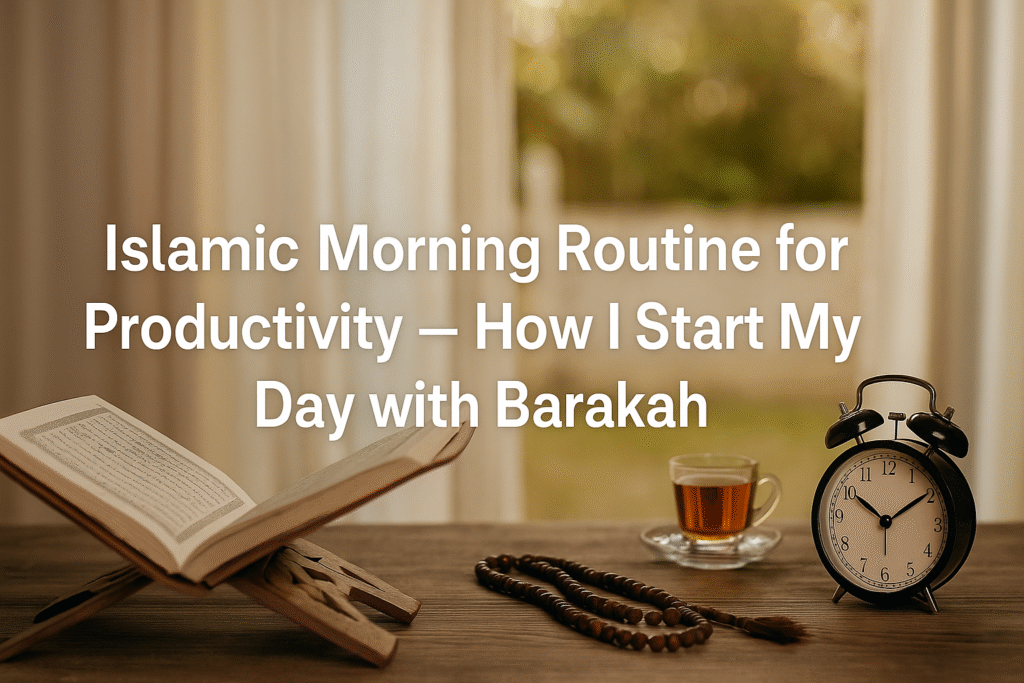
Islamic Morning Routine for Productivity: How I Start My Day with Barakah
Introduction
Islamic Morning Routine for Productivity Every morning, I wake up knowing I have two options: rush into the day half-asleep and distracted or rise with barakah, gratitude, and purpose.
For a long time, I used to start my mornings scrolling through notifications, sipping coffee while anxiety crept in. But when I began aligning my mornings with the Sunnah and the guidance of the Qur’an, everything changed. My energy, focus, and peace all transformed.
In Islam, productivity isn’t about hustling blindly, it’s about living intentionally, with the remembrance of Allah in every action. The Prophet ﷺ said:
اللهم بارك لأمتي في بكورها
“O Allah, bless my nation in their early mornings.”
(Sunan Ibn Majah, 2236)
That’s where the secret lies in the early hours, where Allah places barakah. Let me share my personal Islamic morning routine for productivity one that has truly helped me thrive in both deen and dunya.
Waking Up with Purpose (Before Fajr)
The first step to a productive day starts the night before. I try to sleep early because the Prophet ﷺ disliked talking after ‘Isha. Waking up in the last part of the night even if just 10–15 minutes before Fajr — has been life-changing for me.
This time, known as Tahajjud time, is when Allah descends to the lowest heaven and says:
“Is there anyone calling upon Me, that I may answer him? Is there anyone asking of Me, that I may give him?”
(Sahih Muslim, 758)
I don’t always manage it, but on days I do, I feel peace that coffee can’t give. I start with wudu, pray two rak‘ahs, and make personal du‘a asking for focus, clarity, and sincerity for the day ahead.
Fajr: The Foundation of a Productive Day
Fajr is not just a prayer; it’s a spiritual discipline. The Prophet ﷺ said:
“Whoever prays the morning prayer is under the protection of Allah.”
(Sahih Muslim, 657)
After Fajr, I resist the temptation to go back to sleep. Instead, I sit quietly sometimes outside or by the window reciting adhkar and reflecting on gratitude.
The Prophet ﷺ and his companions used to stay seated after Fajr remembering Allah until sunrise. (Sunan Abu Dawood, 1287)
In that calm hour, my thoughts are clearest. I often read a short passage from the Qur’an — even a few verses — and let them shape my mindset.
“And remember your Lord within yourself in humility and in fear without being loud in speech — in the mornings and the evenings.”
(Qur’an 7:205)
Dhikr & Qur’an — Nourishment Before Nourishment
Instead of grabbing my phone first, I grab my misbahah (tasbih) and begin my morning adhkar:
SubhanAllah (33 times)
Alhamdulillah (33 times)
Allahu Akbar (34 times)
This remembrance sets a positive emotional baseline for the entire day. Research today even shows how early gratitude practice boosts dopamine and focus — a truth Islam taught 1400 years ago.
Then I recite or listen to Surah Yaseen or Surah Al-Mulk the “heart-openers.” It’s less about finishing pages and more about letting one ayah sink deep.
Healthy Breakfast and Mindful Preparation
The Prophet ﷺ said:
“The son of Adam does not fill any vessel worse than his stomach.”
(Sunan Ibn Majah, 3349)
So I keep breakfast light and wholesome — oats, fruits, eggs — avoiding sugary foods that drain energy. I eat with Bismillah, with my right hand, and stop before I’m full. These small Sunnah habits bring barakah to what I consume.
While preparing, I often listen to a short reminder or a podcast about Islamic mindset or tafsir — it feeds both the body and the soul.
Planning My Day with Niyyah (Intention) 
Once my spiritual base is strong, I move into planning. I write 3–5 priorities in my planner not just tasks but intentions.
For example:
“Finish client report for Allah’s sake — excellence is part of faith.”
“Call my parents — a form of sadaqah.”
“Exercise — to maintain the body Allah entrusted me with.”
When I attach niyyah to productivity, mundane work turns into ibadah.
As the Prophet ﷺ said:
“Actions are but by intentions.”
(Sahih Bukhari, 1)
This mindset keeps me consistent even on low-energy days.
Work or Study Time — With Barakah Principles
After sunrise and Duha prayer (around mid-morning), I start my main work.
I’ve learned that spiritual focus translates into practical focus.
Here are my key habits inspired by Islamic values:
Begin work with Bismillah.
Avoid gossip and negativity at work, they kill productivity and peace.
Take short breaks for dhikr.
Keep the tongue busy with remembrance rather than idle talk.
Pray Duha Salah (2–8 rak‘ahs). The Prophet ﷺ said:
“In the morning, charity is due on every joint of the body.”
(Sahih Muslim, 720)
Duha acts as a daily reset and brings immense barakah in time.
Gratitude Reflection Mid-Morning
Before lunch, I pause briefly for shukr gratitude journaling. I write three things I’m grateful for something spiritual, something worldly, and something personal.
Gratitude keeps my focus on abundance instead of anxiety. Allah says:
“If you are grateful, I will surely increase you.”
(Qur’an 14:7)
This single ayah reminds me that barakah grows where gratitude lives.
Summary of My Morning Routine
| Time | Activity | Purpose |
|---|---|---|
| 4:45–5:00 am | Wake up, wudu, Tahajjud | Connect with Allah in quiet stillness |
| 5:15 am | Fajr prayer | Spiritual grounding |
| 5:30–6:30 am | Dhikr, Qur’an, reflection | Feed the soul |
| 6:45 am | Healthy breakfast | Energize body with barakah |
| 7:00 am | Plan & set niyyah | Align intentions with goals |
| 7:30 am onward | Work / study + Duha | Act with focus and gratitude |
Even if I don’t follow it perfectly every day, trying brings results more peace, better time management, and genuine productivity that feels purposeful.
Lessons I Learned from Living This Routine
Early hours carry barakah I achieve more between Fajr and 10 am than in the rest of the day.
Productivity isn’t speed — it’s alignment. Doing less with sincerity brings more results.
Routine is ibadah when rooted in remembrance.
Qur’an and dhikr are better stimulants than caffeine.
Every morning is a second chance.
Even on days I oversleep or miss a step, I start again the next morning that’s part of growth.
Conclusion
An Islamic morning routine for productivity isn’t about copying someone’s schedule; it’s about creating habits that nurture both your soul and your goals.
When I began my mornings with remembrance, intention, and gratitude, my entire day changed not because of time hacks, but because of barakah.
“So remember Me; I will remember you. And be grateful to Me and do not deny Me.”
(Qur’an 2:152)
Every sunrise is an invitation a gentle call from Allah to start again, with light in the heart and purpose in the mind.
May Allah bless our mornings, our work, and our time with barakah.
FAQs
- What is an Islamic morning routine for productivity?
It’s a routine rooted in Qur’an and Sunnah that combines prayer, dhikr, healthy habits, and intentional planning to bring barakah and focus to your day. - Why is the morning important in Islam?
Because the Prophet ﷺ prayed for blessing in the early hours: “O Allah, bless my nation in their mornings.” (Ibn Majah 2236) - How can I become more productive as a Muslim?
Begin early, pray Fajr, remember Allah, plan your day with niyyah, and avoid wasting time on distractions. - Can I use this routine if I work late nights?
Yes — adjust times but keep the sequence: prayer → remembrance → reflection → action. - What should I recite after Fajr?
Morning adhkar, Qur’an recitation (like Surah Yaseen or Al-Mulk), and dua for barakah. - What is Duha prayer and why is it beneficial?
It’s a voluntary prayer after sunrise. The Prophet ﷺ said it brings charity reward for every joint. (Sahih Muslim 720) - Does waking early help mental health?
Yes, early mornings reduce stress and improve focus — combining dhikr with calm silence is therapeutic. - How can I stay consistent?
Sleep early, reduce screen time before bed, and remind yourself of Allah’s promise of barakah in the morning. - What foods did the Prophet ﷺ recommend for breakfast?
Dates, milk, barley, honey, and light balanced meals — all simple and nourishing. - How can I teach my kids a morning routine in Islam?
Start small: wake them for Fajr, do dhikr together, share one hadith, and celebrate their effort.